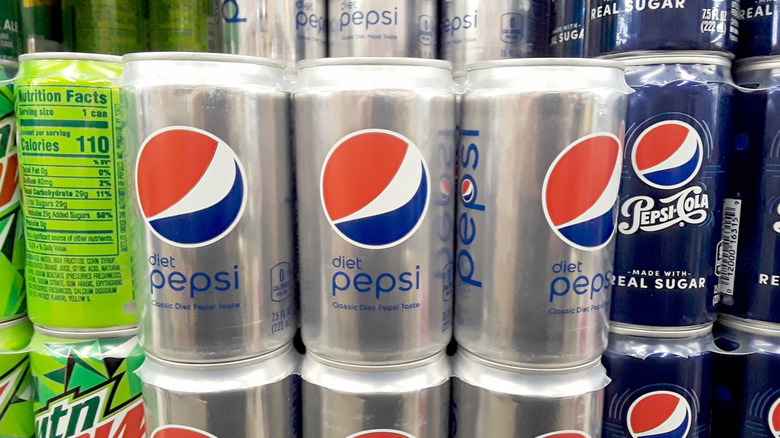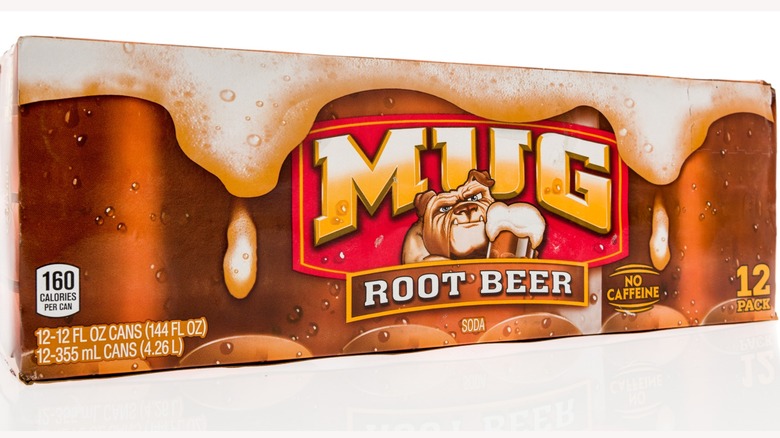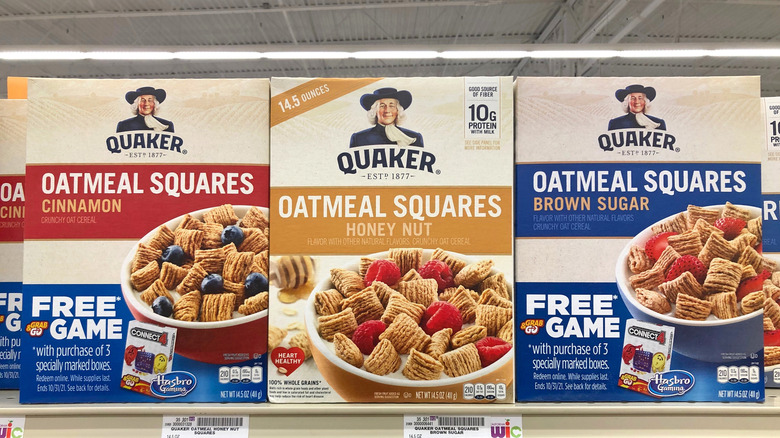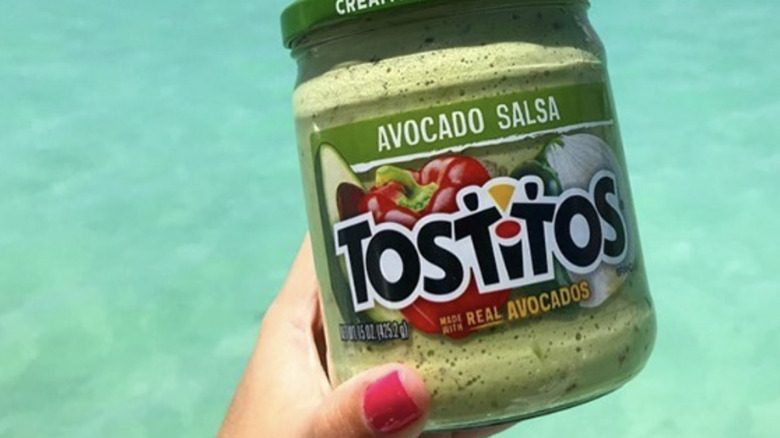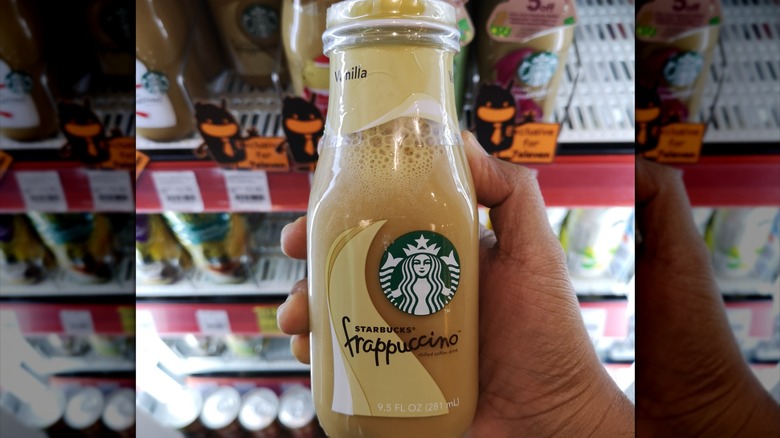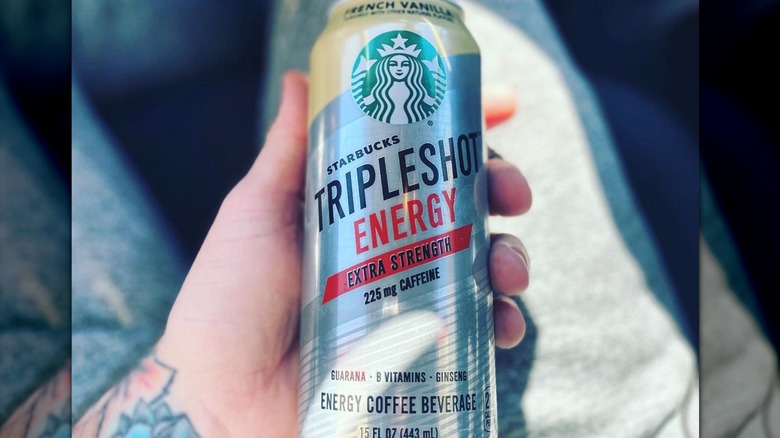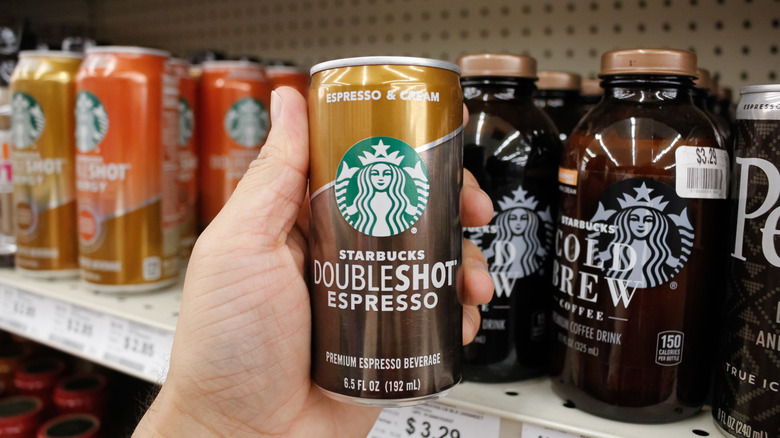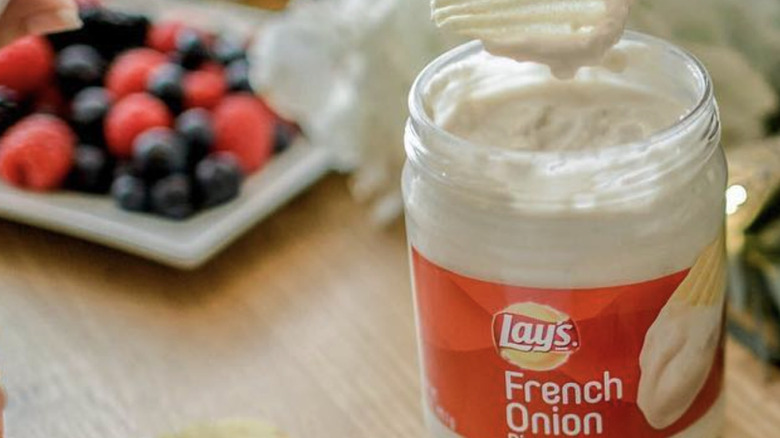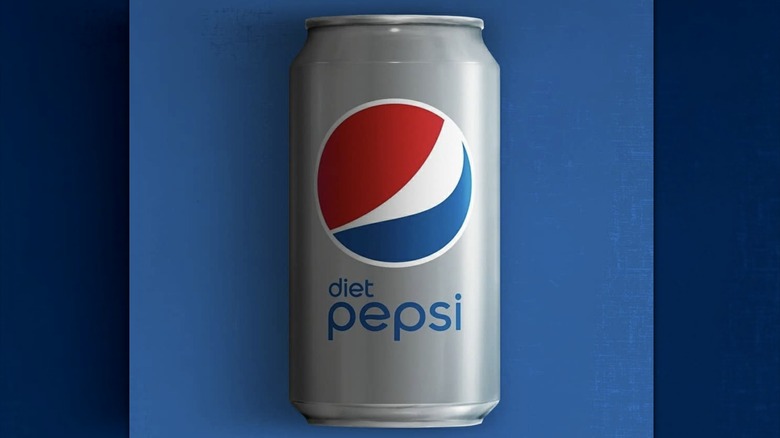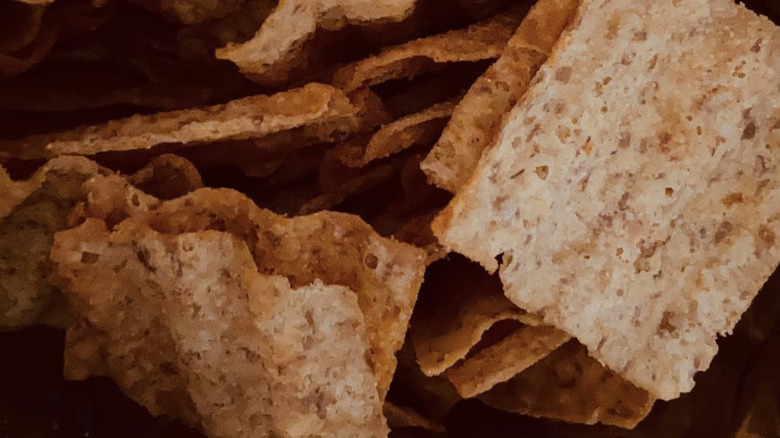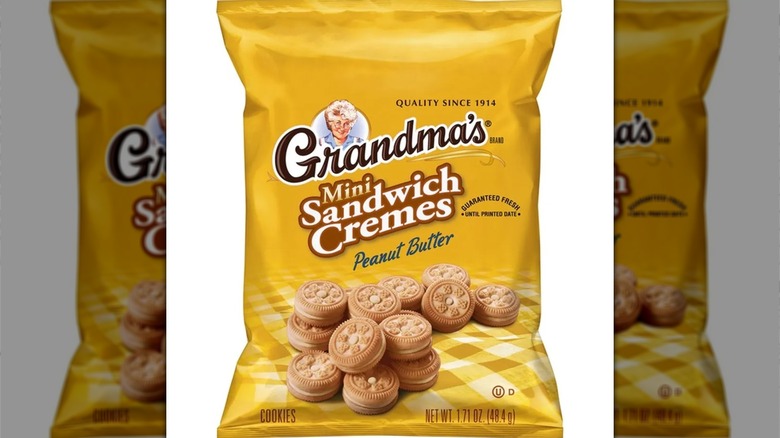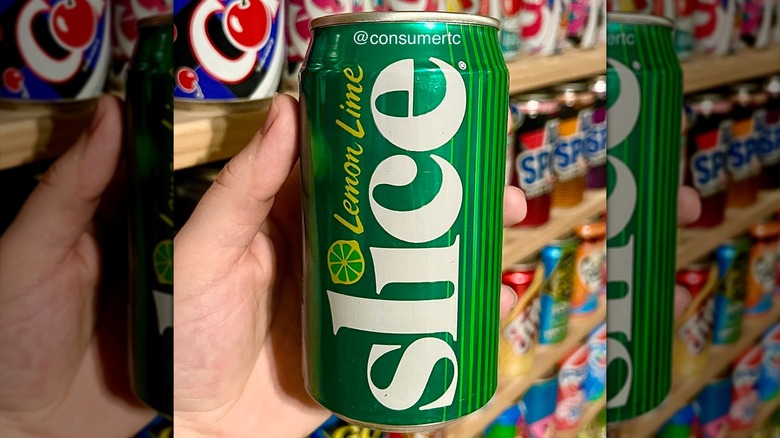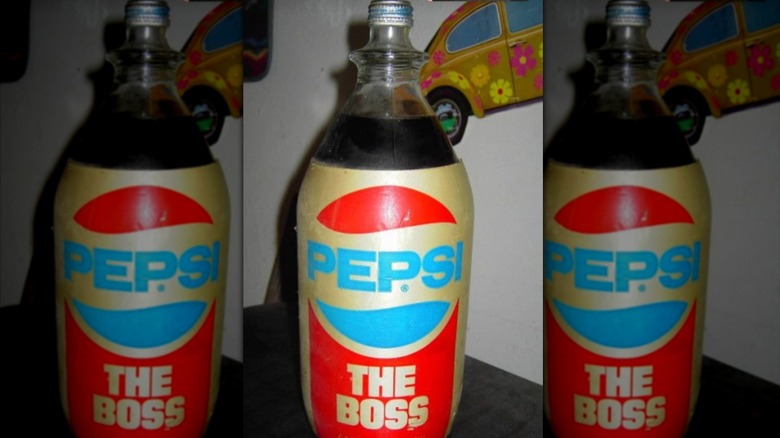The Biggest Recalls In PepsiCo History
PepsiCo makes a lot more than just soda. This probably isn't news to you, but if it is, the cola giant owns nearly two dozen food and drink brands, including Starbucks bottled beverages and Quaker Oats. When a parent brand churns out as many different products as PepsiCo does, major recalls are bound to happen. Some of PepsiCo's recalls have been so big, they left lasting impacts on the food and beverage industry.
Pepsi-Cola, as it was originally known, has been around since 1898. It spent the first half of the 20th century trying to keep up with its ultimate competitor: Coca-Cola. After a 1965 merger with chip king Frito-Lay, Pepsi officially became PepsiCo. The move helped Pepsi gain a foothold in the prepackaged snack space and has held steady ever since. The amount of PepsiCo recalls isn't excessive for a company of its size, but the frequency of recalls in the food and cosmetics industry has increased between 20 to 25% in the last three years, making PepsiCo vulnerable. These are the biggest recalls the company has had to face in its long and prominent history.
Mug Root Beer in 2024
In 2024, labeling errors accounted for almost half of the food recalls in the U.S. PepsiCo's Mug Root Beer was part of that statistic. The company announced a voluntary recall for 12-pack cans of Mug in March 2024 because what was actually in those cans was Mug Zero Sugar. The mislabeled 12-packs were distributed in Arkansas, Louisiana, Mississippi, New Mexico, Oklahoma, and Texas. The FDA terminated the recall one month later, after a total of 2,801 cases of Mug Root Beer were pulled from circulation. That's 33,612 cans of root beer.
Adding insult to injury was the fact that PepsiCo had to recall its Schweppes Ginger Ale in a nearly identical mixup two weeks before recalling Mug. In the Schweppes scenario, 5,592 cans, packed in 24-count cases were labeled as Zero Sugar Ginger Ale but contained the full-sugar version. Both situations posed a particular risk to soda consumers who need to monitor their blood sugar.
The 2024 labeling mishap wasn't the first time Mug was on the FDA's bad side. In 2003, PepsiCo had to recall cans of Mug that came from a bottling plant in Burnsville, Minnesota. Why? It was a similar story. The Mug Diet Root Beer cans were filled with full-sugar soda.
Quaker Oats products in 2023 and 2024
When PepsiCo acquired the Quaker Oats brand in 2001 in a $13.8 billion deal, it took on a centuries-old heritage brand so large, the deal required clearance from the Federal Trade Commission (FTC). At the time, PepsiCo was willing to spend big on Quaker just to acquire Gatorade, which held 80% of the sports drink market. Along with Gatorade came Quaker's scroll of cereal products. Two decades later, some of those cereal products would wind up contributing to one of the most epic recalls in PepsiCo's history.
On December 15, 2023, Quaker recalled approximately 40 products, primarily granola bars, granola cereal, and snack packs, because they were potentially tainted with salmonella bacteria. By January 11, 2024, the recall was expanded to include more granola bar flavors, Cap'n Crunch cereal bars, Quaker and Cap'n Crunch breakfast cereal, Gatorade Protein Peanut Butter Chocolate Bars, and other snack mixes. When the recall expanded a second time on January 31, 2024 it affected more than 60 products. All of the at-risk inventory came from a PepsiCo manufacturing plant in Danville, Illinois.
When the FDA inspected the Danville plant, Salmonella Cubana was found in multiple places throughout the plant. The inspectors also observed an unsanitary environment rife with health code violations. The Quaker recalls caused a volume loss of around 22%, and PepsiCo was not pleased. By June of 2024, PepsiCo shut the Danville plant down for good.
Tostitos Avocado Salsa Dip in 2023
Tostitos is typically a source of pride and joy for Frito-Lay, and in turn, PepsiCo. That wasn't the case in June 2023 when the Tostitos Avocado Salsa Dip was recalled en masse. Avocado Salsa (which is basically jarred guacamole) was one of the newer varieties in Tostitos' dip arsenal — it debuted in February 2020 — and people were into it. The troubling recall, which was triggered by an undeclared allergen, was a threat to Avocado Salsa's nascent existence.
Fans of the Tostitos Avocado Salsa loved that it was both creamy and full of veggies. According to the ingredients list on the back of the jar, that creaminess wasn't supposed to be brought to you by dairy milk ... but it was. During production, thousands of Avocado Salsa jars were fitted with a nutritional back label intended for a different type of Tostitos dip. This made the ingredients list on the Avocado Salsa jars completely inaccurate. The mislabeled jars did not list milk as an ingredient, thereby posing a major health risk to consumers with dairy allergies or sensitivities.
If someone with a severe milk allergy consumes dairy, it could cause anaphylaxis, an allergic reaction that restricts the body's airways and can cause death. In view of this risk, the FDA wasn't playing around and designated the Tostitos recall as Class I. When the recall was initiated, the mislabeled Avocado Salsa had been in stores nationwide for two months. The recall quantity accounted for 94,668 pounds of Avocado Salsa.
Starbucks Vanilla Frappuccino bottled coffee in 2023
PepsiCo has been bottling coffee drinks for Starbucks since 1994, when the two corporations teamed up to form the North American Coffee Partnership (NACP). The deal helped Starbucks break into the retail drink market in a major way and brought in a ton of business for PepsiCo. Since PepsiCo owns several industrial plants in the U.S., it was responsible for bottling and canning the coffee drinks. In January 2023, quality control issues on PepsiCo's end triggered a massive recall of Starbucks Vanilla Frappuccino bottled coffee after pieces of glass were found inside some bottles.
The Class II recall made 25,200 cases of Vanilla Frappuccino bottled coffee unfit for consumption — that's equivalent to 302,400 bottles. The FDA didn't terminate the recall until July 20, 2023. PepsiCo kept a tight-lipped stance on the recall details. How the glass pieces found their way into over 300,000 bottles of product was never reported, and no injuries associated with the foreign contaminant were disclosed either. In February 2023, PepsiCo gave a statement to The Independent saying the company would "always act with an abundance of caution whenever a potential concern is raised."
In 2024, PepsiCo announced it was shuttering four of its bottling plants. The decision resulted in hundreds of employees losing their jobs. It's unclear whether the Starbucks Vanilla Frappuccino bottled coffee catastrophe was partly a catalyst for the closures.
Starbucks French Vanilla Espresso Tripleshot cans in 2022
With PepsiCo's help, Starbucks has developed a lot of successful bottled and canned coffee drinks, but the production process of said beverages has had its share of problems. An August 2022 recall for Starbucks French Vanilla Espresso Tripleshot was one of those times. PepsiCo announced a recall for the 15-ounce cans because there was a chance that metal fragments had gotten inside. Potentially afflicted cans of Starbucks French Vanilla Espresso Tripleshot were pulled from the market in Arkansas, Arizona, Florida, Illinois, Indiana, Oklahoma, and Texas.
In total, PepsiCo recalled 221 cases of Starbucks French Vanilla Espresso Tripleshot, or 2,652 cans. The FDA gave the recall a Class II designation due to the significant risk of choking or dental injury that might occur from drinking metal fragments. Thankfully, there were no reported injuries associated with the recall. The recall was terminated on November 8, 2022, but for PepsiCo and Starbucks, poor performance on the production line was becoming a repeat problem.
Starbucks Doubleshot Espresso cans in 2021
Starbucks and PepsiCo have a seemingly unbreakable bond operating as NACP, but this power couple has its flaws. In September 2021, the partnership initiated a mammoth recall for three varieties of Starbucks' popular Doubleshot Espresso cans. The cans were recalled due to a sealing defect that made the product vulnerable to premature spoilage. The quality issue affected 6.5-ounce cans of Starbucks Doubleshot Espresso and Cream, Starbucks Doubleshot Espresso and Light Cream, and Starbucks Doubleshot Espresso and Salted Caramel Cream. A single lot of each Doubleshot variety was recalled, and each one included 85,956 cases. In all, 257,868 Doubleshot cases were taken off the market as part of the massive recall.
The Doubleshot cans were sold nationwide. All consumers who purchased the compromised product were encouraged to return it to the place of purchase for a refund. Considering the sheer volume of Doubleshot cans recalled, it was a stroke of luck for Starbucks and PepsiCo that there were no reported illnesses linked to this recall. To this day, it remains the biggest recall in NACP's history.
Frito-Lay dips in 2020
In the spring of 2020, worldwide lockdowns caused by COVID-19 reminded us how essential grocery stores really are — they remained open all throughout the pandemic. At a time when consumers were relying on store-bought food more than ever, PepsiCo suffered one of the biggest product recalls in its history. On May 4, 2020 Frito-Lay recalled multiple varieties of Ranch Dip and Onion Dip sold under the Lay's and Ruffles brands due to mold contamination. The Class II recall quantity totaled 6,344,323 pounds.
The potentially moldy jars of Lay's Smooth Ranch Dip and French Onion Dip were sold in the U.S. The recalled jars of Ruffles Ranch Dip and Onion Dip were sold in Canada. The production numbers involved were huge. For the Lay's Smooth Ranch Dip alone, a total of 2,997,108 jars were implicated in the recall.
Despite the recall's staggering weight, PepsiCo didn't issue a press release detailing the situation. Since PepsiCo (and the FDA for that matter) kept the issue discrete and no cases of mold sickness were reported, there was little to no media coverage about it. At the time, tense grocery shopping trips marked by long lines and low stock were the expectation, so many shoppers may have assumed the dips' absence was COVID-related. Either way, PepsiCo was able to scrap a behemoth amount of dip from store shelves and hardly anyone noticed.
Diet Pepsi in 2019
When an April 2019 recall pulled a huge amount of Diet Pepsi from circulation, the loyalty of PepsiCo's sugar-free cola drinkers was tested. The recall pertained to mislabeled Diet Pepsi cans. While the outer packaging indicated that the Diet Pepsi contains Aspartame, the cans themselves were labeled Aspartame-free. Six-packs, 12-packs, 20-packs, 24-packs, and 36-packs of Diet Pepsi were subject to the recall.
Before the error was caught, 9,214 cases of mislabeled Diet Pepsi were shipped to Southern California with intent for larger distribution. Selling the inconsistently labeled cans would have undoubtedly caused confusion amongst consumers (at least for those who read both packaging labels), but that wasn't the only reason for PepsiCo's recall. Federal law requires food and beverage manufacturers to list all the ingredients it adds to products sold to the public. Aspartame is an artificial sweetener commonly added to diet sodas and some people purposely avoid it.
Although the World Health Organization (WHO) has said there is limited evidence that aspartame causes cancer in humans, the popular sugar substitute has been beleaguered by its carcinogen reputation for decades. Aspartame's inclusion in sugar-free foods and drinks has been the subject of many class action lawsuits — including one against Diet Pepsi in 2017. Consumers with a rare congenital disorder called phenylketonuria (PKU) are more acutely vulnerable to accidental aspartame consumption. PKU prevents the body from breaking down phenylalanine, an amino acid in aspartame, significantly increasing the risk of phenylalanine toxicity.
6 Grain Medley Creamy Roasted Garlic SunChips in 2013
Zesty, wavy, and multigrain, Frito-Lay's SunChips have long occupied an enviable niche in the uber-competitive chip business. SunChips debuted in 1991 and have enjoyed a solid fan base ever since. Years of brand trust allowed SunChips to expand its flavor portfolio, and in 2012, it introduced Six Grain Medley Creamy Roasted Garlic. The six grains present were corn, wheat, oats, brown rice, buckwheat, and quinoa. The SunChips Six Grain medley chips also came in a Parmesan and Herb flavor. By February 2013, the Creamy Roasted Garlic version of Six Grain Medley SunChips was recalled, but the recall was still pretty huge.
Frito-Lay recalled the Creamy Roasted Garlic SunChips over concerns that they were contaminated with pieces of metal mesh. The voluntary recall resulted in 13,812 cases being withdrawn from the retail market. The suspicious Six Grain Medley Creamy Roasted Garlic SunChips were sold in grocery stores, food service establishments, and vending machines nationwide. The metal mesh ordeal wasn't just Frito-Lay's cross to bear. The SunChips recall was part of a larger recall that stemmed from Dakota Specialty Milling, Frito Lay's grain supplier.
Dakota Milling announced a recall on February 14, 2013 of its specialty flour and grain blends because metal mesh had contaminated their manufacturing process. The mesh came from a defective metal screen that was present on the production line. The foreign contaminant was responsible for nine secondary recalls, Frito-Lay's among them.
Grandma's Peanut Butter Sandwich Cookies in 2012
Frito-Lay is the current owner of Grandma's cookies, but the company was originally established in 1914. With more than a century of cookie-baking under its belt, Grandma's knows its way around the most classic flavors: chocolate chip, peanut butter, oatmeal raisin and the like. Grandma's is no stranger to sandwich cookies either, Sandwich Creme Vanilla and Sandwich Creme Peanut Butter Cookies have been part of the brand's repertoire for years. In November 2012, Grandma's Peanut Butter Sandwich Cookies were at the center of a big recall for undeclared ingredients.
Packages of Grandma's Sandwich Creme Peanut Butter Cookies and Peanut Butter Mini Sandwich Cremes Cookies were named in the recall. None of Grandma's other cookie flavors were affected. The FDA categorizes milk and egg as major allergens and requires all pre-packaged food and drink items that use these ingredients to print an allergen warning on the label. The labeling error that prompted the recall affected 156,462 pounds of Grandma's Sandwich Creme Peanut Butter Cookies nationwide. Peanut Butter Mini Sandwich Cremes Cookies are no longer available to purchase.
Lemon Lime Slice in 1986
In the 20th century, food and drink recalls were nowhere near as frequent as they are now, so when they did happen, it rarely escaped public notice. The lead-up to PepsiCo's Lemon Lime Slice recall in 1986 was equal parts alarming and bizarre. Soda drinkers in the New York City metropolitan area were on high alert that July after an anonymous male called 911 and informed police that he had contaminated Pepsi bottles with cyanide. The caller even disclosed the lot number for the products that were targeted.
Seeing as the caller's description of "Pepsi bottles" was vague, authorities honed in on the lot number information. The lot that matched the number the closest implicated 66,000 bottles of Lemon Lime Slice. All of them were recalled. Charles Thomas, who was vice-president of Pepsi-Cola at the time issued a statement to the New York Times, assuring that ”about 7,000 of the 11,000 cases are under lock and key.” The precaution proved to be a crucial one. No known cyanide poisonings occurred after the threat was made. That same year, PepsiCo acquired lemon-lime soda brand 7UP and Lemon Lime Slice faded into obscurity.
Glass soda bottles in 1979
"Grandma, tell me about when 2-liter glass bottles of Pepsi used to explode into people's faces and necks," isn't an oft-requested nostalgic tale — but it did happen in the '70s. Back then, Pepsi began enhancing the volume of its bottles to meet consumer demand. Two-liter bottles were a common sight at grocery stores toward the late 1970s, but they were made of glass and shattered without warning.
The large glass soda bottles couldn't withstand the pressure created by the soda's carbonation, so they exploded. Two-liter Pepsi bottles were the first to be introduced in the U.S. in 1978, and they were part of the problem. A high profile case in Canada kickstarted the recall of plus-sized glass soda bottles. A 3-year-old boy got caught in the crossfire of a soda explosion and was permanently blinded in one eye. Following the incident, a Canadian engineer named David Barham began studying large soda bottles from various brands. He observed that more often than not, the bottles burst if tipped over. Barham's findings led to a recommendation that 1.5-liter and 2-liter soda bottles be recalled.
When the Canadian Soft Drink Association gave pushback, Barham went on national television and demonstrated how easily the bottles exploded when gently knocked over. Public outcry from disturbed viewers ultimately pushed the government to issue a recall. In the Toronto area alone, 50,000 cases were pulled from shelves. A permanent solution was ushered out soon after. The bottles became plastic.
